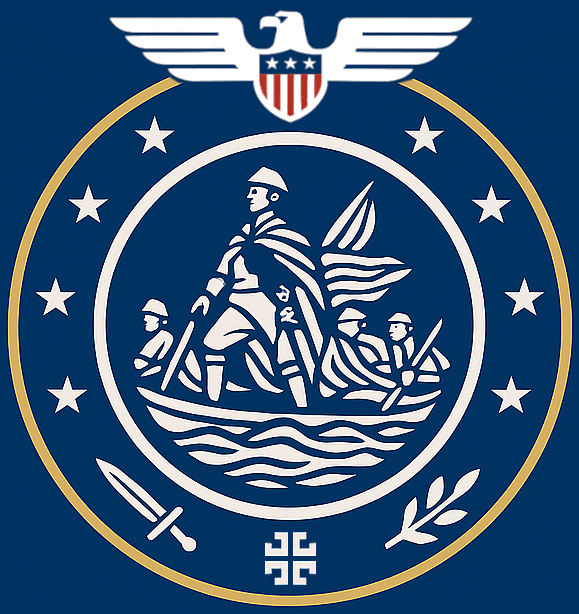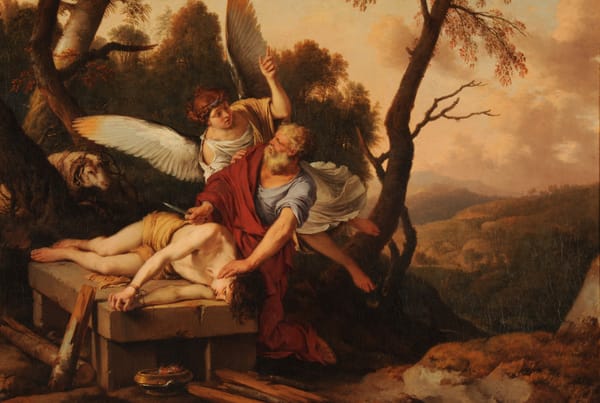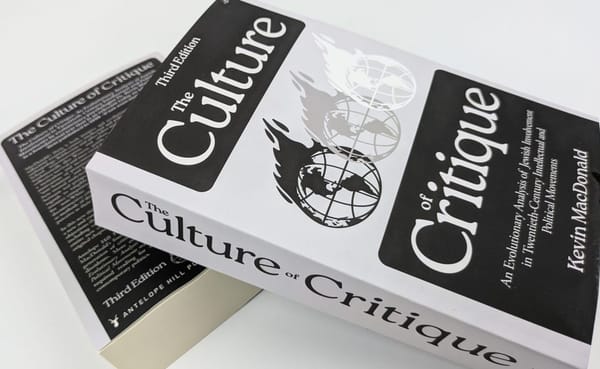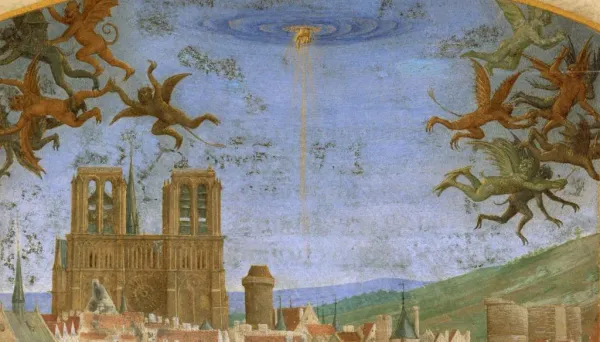A Primer on Leo Strauss and Straussianism for Christian Nationalists
You need to understand where these ideas come from, how they distort our principles, and how they spread.
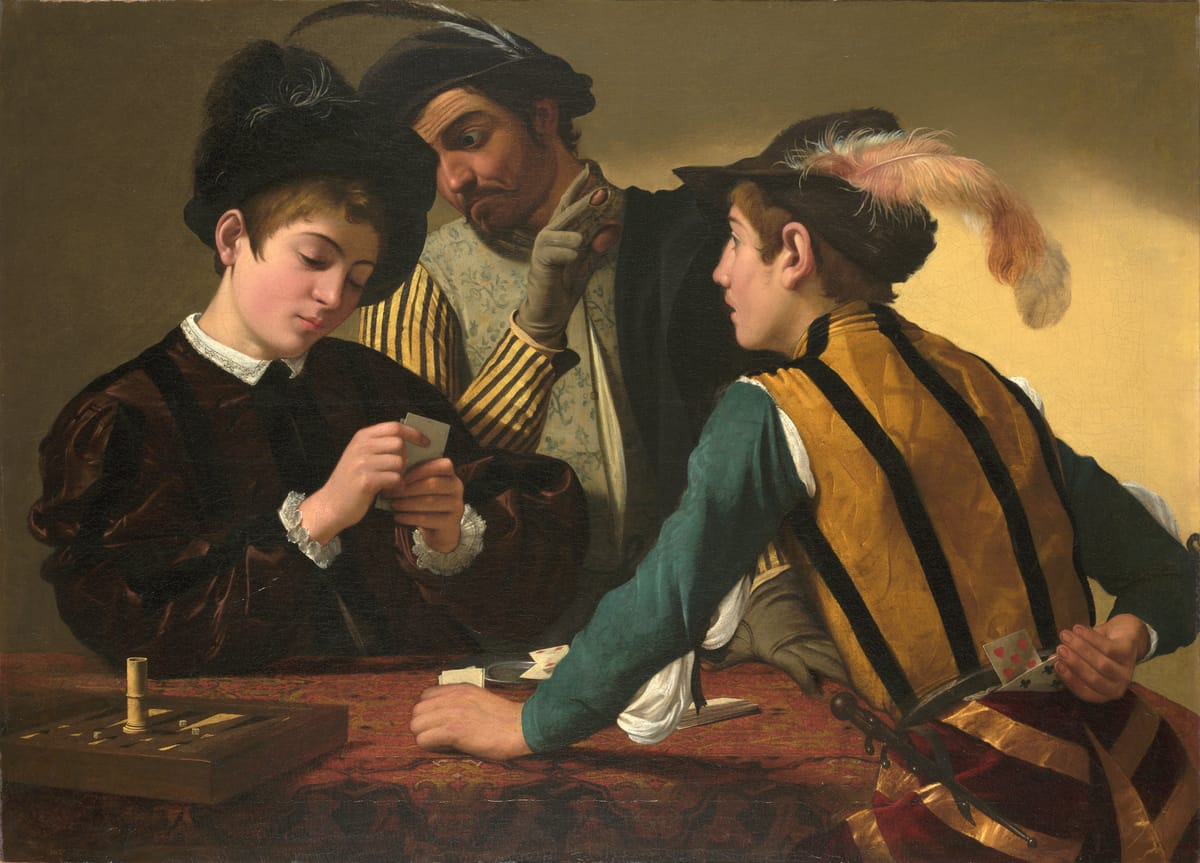
Opening the can of worms that is Leo Strauss and Straussianism is no small feat. Strauss’s ideas are complex, but understanding them is crucial for American Christian Nationalists navigating today’s political battlefield. Straussianism—the philosophy and method of Leo Strauss—runs deep in the American Right, with influence arguably at an all-time high in the Trump era. Thinkers like J.D. Vance, Ben Shapiro, Clarence Thomas, Curtis Yarvin, Charlie Kirk, and even Bronze Age Pervert (Costin Alamariu) carry its fingerprints. You might be surprised by some names on that list, but it’s just the tip of the iceberg. Straussian ideas are woven throughout the Right, becoming visible once you know what to look for.
This article aims to be clear and straightforward. It’s a primer, not a deep dive—but it will help you recognize Straussian influences when you encounter them. Keep in mind, there’s much more detail and many more connections than can fit into a short overview like this. We’ll start with Strauss himself, trace his influences, and unpack what Straussianism really is so you can see why it matters in today’s fight.
Origins
To understand Straussianism, you have to start with the man himself. Leo Strauss, a Jewish philosopher born in Germany in 1899, lived through the collapse of the Weimar Republic (1919–1933). As Hitler’s National Socialists rose to power, Strauss was working within the Frankfurt School, where his critical approach and subversion of traditional values drew suspicion. The National Socialists were not willing to tolerate that influence, and his position in German academia became untenable. His friend and associate Carl Schmitt, an often-cited thinker on the modern Right for his work on the Friend-Enemy distinction, endorsed Strauss and was instrumental in securing him a Rockefeller Foundation fellowship. That grant enabled Strauss to leave Germany for Paris and later England. Eventually, in 1937, he fled National Socialist persecution altogether for the United States.
That move shaped Strauss in profound ways. In America, he joined the University of Chicago (1949–1969), where he developed his ideas and started a long academic career that captivated many students. This laid the groundwork for Straussianism—a philosophy that mixes the love of universal truths (particularly Natural Law), the practice of reading texts for hidden meanings (the esoteric/exoteric distinction), and a harsh critique of modern liberalism. It’s the seed of what is seen on the Right today.
His seminars weren’t just classes—they resembled secret societies dedicated to decoding ancient texts. Students like Harry Jaffa, founder of the Claremont Institute, hung on his every word and spread his ideas far and wide. Strauss taught that the key to understanding philosophy and history was to study the “Great Books” of thinkers such as Plato and Aristotle, Machiavelli, Nietzsche, John Locke, and others. He was also deeply influenced by medieval thinkers like Maimonides—a Jewish scholar who sought to develop ways for Jews to integrate into Gentile societies—and Al-Farabi, a Muslim philosopher.
Both Maimonides and Al-Farabi wrote esoterically—meaning they embedded hidden messages within their works that readers were supposed to discover through deep study. You can see why a Jew living in an Islamic or Christian-dominated society would want to conceal his true thoughts to avoid backlash. Strauss took this principle and universalized it, insisting that the greatest minds in history all concealed their true teachings behind layers of hidden meaning, accessible only to a select, discerning elite. This approach has strong parallels to Gnostic traditions, which similarly claim that true knowledge is hidden from the masses and reserved for a select, enlightened few. By teaching that these hidden meanings required special skill to uncover, Strauss set up himself—and his students—as privileged interpreters of the canon.
For Straussians, what matters isn’t what these great thinkers actually said, but what Strauss said they meant. Strauss taught that the greatest thinkers concealed their real teachings behind an exoteric surface and an esoteric core. For example, he argued that Plato’s Republic isn’t a sincere blueprint for an ideal state, but a satire exposing the dangers of utopianism. Likewise, Machiavelli’s The Prince, rather than being a cynical how-to manual for tyrants, becomes a coded message encouraging republican liberty. In both cases, Strauss claims these authors didn’t mean what they said on the surface—but something subtler and more radical beneath. His interpretations often invert centuries of traditional understanding, privileging his own readings over what the authors appear to say. This re-centers Strauss—not the text—as the true source of meaning.
A prime example of this method in action comes from Harvey Mansfield, a trained East Coast Straussian. In an interview reflecting on Strauss’s legacy, Mansfield recounts how Strauss would leave seemingly innocuous numbers in footnotes—numbers that, to the untrained eye, meant nothing. But to Mansfield, they were part of a hidden code. He took the time to decipher them, convinced they held deeper significance. This wasn’t literary analysis in the conventional sense; it was exegetical detective work, rooted in the assumption that Strauss had buried secret teachings within the structure of the text itself.
This anecdote isn’t just quirky—it’s emblematic of the Straussian method: the belief that great thinkers always speak in riddles, and that only a select few can decode their true meaning. For Straussians, to read a book rightly is not to accept what it plainly says, but to unravel what its author dared not say aloud. It reinforces a priesthood of interpreters who hold the keys to truth—not through divine revelation, but through philosophical initiation.
This clip runs from 51:35 to 56:00. It’s a short segment, but it gives you a clear feel for how Straussians seek to esoterically interpret ancient texts. If you want to deep dive further, the full interview is worth checking out, it is a fascinating look into their mindset and methods.
https://youtu.be/t-gH7Waedtk?si=upIIi04LmdQbB1m_&t=3095
By extension, Strauss’s followers came to treat his interpretations of these thinkers as definitive. This might sound appealing to Christians committed to reading primary sources—similar to the Reformed Retrieval movement—but there’s a crucial difference. Instead of engaging directly with the primary sources of our own tradition, it means relying on a Jewish scholar, who fled Christian Germany after subverting its universities, to tell you how to understand what George Washington meant about the American political landscape. Strauss’s method of interpretation became foundational for his students, ultimately giving rise to distinct and sometimes competing schools within the American Right.
East Coast vs. West Coast Straussians
Over time, Strauss’s students carried his approach in different directions, giving rise to two major factions that continue to shape conservative politics: the East Coast Straussians, and the West Coast Straussians associated with the Claremont Institute.
East Coast Straussians emphasize applying Straussian ideas practically to politics. They draw on Strauss’s admiration for figures like Thucydides and Machiavelli, stressing the need for prudent statesmen who can navigate the tension between philosophical ideals and political realities. This emphasis on practical statesmanship and classical realism made East Coast Straussians especially influential among emerging Neoconservatives.
Many Neoconservative intellectuals and policymakers were directly taught by Straussian professors like Allan Bloom or influenced through academic networks at places like the University of Chicago and Harvard. Neoconservatives drew from Strauss’s admiration for ancient virtues—courage, honor, moral duty—and applied them to a modern context. They reasoned that America, as a regime grounded in universal truths, had a duty to spread those truths abroad, even through force. They saw liberal democracy not just as a form of government, but as a moral imperative rooted in Nature and Reason. Straussian readings of Thucydides and Xenophon, filtered through Machiavellian realism, reinforced the idea that noble leadership sometimes requires decisive—perhaps even deceptive—action to secure just ends.
But this logic is flawed. It fuses classical virtue with Enlightenment universalism, transforming prudence into moral crusading. The result: endless wars justified not by defense, but by a mission to “enlighten” others—undermining national interest and Christian just war principles alike.
Key figures among East Coast Straussians include:
Allan Bloom: Author of The Closing of the American Mind, who applied Straussian ideas to critique modern education and culture.
Harvey Mansfield: A Harvard professor known for his work on Machiavelli and modern political thought.
Notable Neoconservatives influenced by this tradition include:
Irving Kristol: Called the "godfather of neoconservatism," Kristol was not a direct student of Strauss but was influenced through overlapping intellectual circles.
Paul Wolfowitz: A student of Allan Bloom, Wolfowitz applied Straussian ideas to foreign policy as one of the architects of the Iraq War under President George W. Bush.
William Kristol: Son of Irving Kristol, who bridged Straussian thought and neoconservative policy through publications like The Weekly Standard.
West Coast Straussians trace their lineage to Strauss’s student Harry Jaffa, a Jewish intellectual and Strauss’s first Ph.D. student. Jaffa wrote on topics ranging from Aristotle and Thomas Aquinas to Abraham Lincoln, Winston Churchill, and Natural Law. He was a founder of the Claremont Institute.
West Coast Straussians like those at Claremont increasingly position themselves as "populists"—defenders of the American people against elite corruption. But this populism is filtered through Straussian lenses. It appeals to the Founding, Lincoln, and the American regime as expressions of Natural Right—universal truths discoverable by reason. While their rhetoric champions Christian civilization and tradition, their foundations remain Straussian: reason before revelation, the regime over religion. This creates tension. What appears to be a return to tradition is often a philosophical repackaging, with deeper loyalties to Straussian liberalism than to Christianity or the historic American nation.
Notable West Coast Straussians include:
Clarence Thomas: Supreme Court Justice who credits Jaffa with influencing his judicial philosophy.
Michael Anton: Author of the 2016 essay “The Flight 93 Election,” which argued that electing Trump was essential to preserve American principles against progressive decay.
J.D. Vance: A frequent speaker at Claremont Institute events, including its Center for the American Way of Life conference. His staff includes Claremont alumni such as Chief of Staff Jacob Reses (Publius Fellow 2016), Deputy Chief of Staff James Braid (Lincoln Fellow 2019), and Press Secretary William Martin (Lincoln Fellow 2024). He is prominently featured on the front page of their website.
This only scratches the surface of Claremont’s intellectual influence. So-called “Claremonsters” are all over the American Right. Previous fellows or those who have studied at the Claremont Institute include Ben Shapiro, Michael Knowles, Jack Posobiec, Charlie Kirk, and Jack Murphy. Other Claremont Fellows who are notable in Reformed Christian Nationalist circles include Nate Fisher, Josh Abbotoy, Megan Basham, and Mike Sabo.
Among these, Christopher Caldwell, author of Age of Entitlement, has gained particular traction in Christian Nationalist spheres. His critique of the post-1960s “rival constitution” ushered in by civil rights reforms, exemplifies the Straussian sleight-of-hand that Christian Nationalists must scrutinize carefully. While its condemnation of progressive overreach may align with Christian Nationalist concerns, Caldwell’s Straussian framework—grounded in natural rights and individual liberty—recasts the American Founding in ways that conflict with a Nationalist vision of a unified nation rooted in Christian faith. He assumes the Founding prioritizes individual freedoms, such as property rights and freedom of association, over a collective national identity anchored in biblical values, sidelining the potential for a strong state to uphold a Christian moral order. Caldwell’s secular narrative of constitutional decline frames the 1960s as a betrayal of Enlightenment rationalism, ignoring the deeper spiritual crisis of secularism’s assault on America’s Christian foundations. While appealing to “nonelite whites,” Caldwell avoids explicit Christian rhetoric, reflecting a Straussian universalism that elevates philosophical reason over divine revelation. This risks diluting the Christian Nationalist call for a state-led revival of a divinely ordained nation. His Straussian and libertarian-leaning critique fails to embrace the need for a strong central authority—a Christian Prince—to restore a national identity rooted in God’s truth rather than abstract ideals.
When you step back, you see that both East and West Coast Straussians, despite their differences, share the same core assumptions and reading strategies rooted in Strauss’s teaching. Whether it’s the neoconservative foreign policy hawks or the populist Claremont crowd, they’re united by an interpretive method, rooted in Strauss’s Jewish intellectual tradition, that claims to see hidden truths while demanding trust in their own authoritative readings. For instance, Michael Anton’s Flight 93 Election argues that America faces existential collapse unless it returns to its founding principles—principles he defines through Jaffa’s Straussian reinterpretation of Lincoln. But Anton’s ‘Lincoln’ is less the devout Christian statesman and more the avatar of Natural Right theorizing. Similarly, Neocon thinkers like Paul Wolfowitz leaned on Bloom’s Straussian Machiavellianism to frame U.S. hegemony as a noble project, masking realpolitik under philosophical idealism. In both cases, the reader is asked to trust that only trained Straussians can rightly ‘decode’ the true American meaning and mission.
Straussianism isn’t just an academic curiosity—it’s a subversive force shaping today’s American Right, redefining traditions even as its advocates claim to defend them. From neoconservative strategists to West Coast populists, Straussian thought supplies the intellectual scaffolding for trading authentic Christian convictions for philosophical sleight of hand. This “sleight of hand” often works by substituting abstract philosophical principles—like “Natural Right” or “the noble lie”—for Scriptural authority and revealed truth. Straussians will praise religion as socially useful but deny its truth claims. Harry Jaffa, for example, argued that the Declaration of Independence was America’s foundational theological document, sidelining the Bible in favor of Enlightenment rationalism. In doing so, Christianity becomes a tool of the regime—not its moral anchor. Straussianism thus reinterprets the Christian tradition as metaphor or political utility, undermining its authority while still claiming to honor it.
If you’re a Christian Nationalist serious about preserving our heritage, you need to understand where these ideas come from, how they distort our principles, and how they spread. Even if these figures aren’t consciously imposing their own authority, they’re shaped by an interpretive framework that subtly alters what our heritage means. That’s why it’s crucial, not to reject everyone influenced by Straussian thought outright, but to examine carefully how these habits can reshape what we believe about our past and our future.
ATTENTION READER: We need your help.
Institutional trust is at record lows. But without institutions, we cannot renew our people, much less provide an inheritance to posterity. In response to this crisis and as an organic outgrowth both of necessity and natural interest, American Mantle exists, not only as a publication for Protestant, right-wing material, but also as a human project with real-world costs. And so we make our appeal.
Donate to the Cause. Help us reach our monthly goal in order to solidify this crucial institution.
